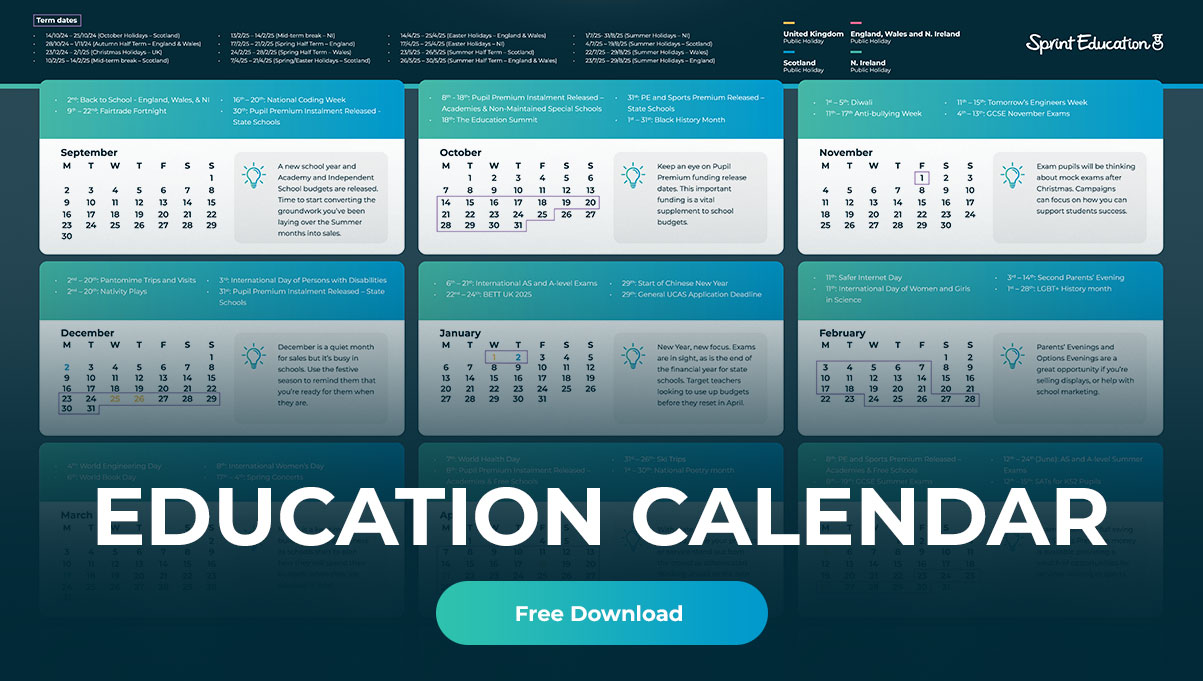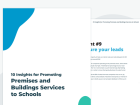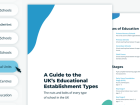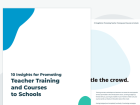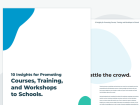Selling to Schools in the Summer Term
Selling to Schools in the Summer Term
Explore the insights of over 3,000 school staff and understand how to shape your education marketing during school's biggest spending period.
Explore the insights of over 3,000 school staff and understand how to shape your education marketing during school's biggest spending period.
The spring term (and hopefully the worst of the winter weather) are now behind us, and we have some good news for you – the summer term is when most school leaders make their big purchasing decisions, according to our own survey of over 3,000 school staff.
So now’s the time to pull out all the stops and deliver a marketing campaign that will turn teachers into leads.
Key dates to consider during the summer term
The long summer term incorporates April, May, June, and July, stretching from the end of Easter to the summer holidays, and the end of the academic year.
In between, you have summer half term (which is usually a week-long but can vary between local authorities and countries) and multiple bank holidays.
The summer term is an incredibly busy period for teachers of exam age pupils. SATs for KS1 usually take place over a week in early May, closely followed by a week for KS2 SATs tests. SATs tests for seven-year-olds (KS1) were due to become non-statutory from 2023 following the introduction of the reception baseline assessment in autumn 2021. However, the DfE has released dates for KS1 SATs up to 2024, so it’s currently unclear whether KS1 SATs will be discontinued, as planned.
GCSEs usually happen from mid-May to late June.
With the average student taking 10 GCSEs, and most exams taking 2 hours, operating a busy exam schedule is a time-consuming task!
Following two years of exam disruption, due to the pandemic, summer 2022 sees a return to exams as normal.
Over the last two years, summer exams have been cancelled and students have received teacher accessed grades based on their performance over the year instead. This has led to grade inflation that has been deemed unsustainable. While 2022 sees a return to exams, the government is planning to avoid a sharp drop in grading by adjusting results. 2022 results are expected to be higher than in 2019, but not as high as 2020.
Of course, the summer term isn’t just about revising and exams! School calendars are often packed during this period with sports competitions, school trips, awareness days, and events. Here’s a small selection of the dates that many schools will be aware of this summer term.
Teacher Appreciation Week: 2 – 8 May A week-long celebration in recognition of teachers and the contributions they make to education and society.
LGBTQIA+ pride month Typically June is known as Pride Month in the UK. LGBTQIA+ pride is the promotion of self-affirmation, dignity, equality, and increased visibility of lesbian, gay, bisexual, and transgender people as a social group.
World Refugee Day: 20 June The United Nations’ World Refugee Day is an international event honouring the courage, strength, and determination of women, men, and children who are forced to flee their homeland under the threat of persecution, conflict, and violence.
RSE Day: 30 June RSE Day (Relationships and Sex Education Day) is an annual event that encourages parents, teachers, carers, and educators to talk openly about relationships and sex education with their children.
US Independence Day: 4 July A date to remember if you’re sending to a US audience.
2022 Commonwealth Games: 28 July – 8 August Commonly known as Birmingham 2022, the event is an international multi-sport event for members of the Commonwealth.
Want to access our full education calendar?
Speak to us about Campus. Our Education Insights Calendar, available only to Campus users, is the most detailed education calendar available to sellers for schools, including events, deadlines, exams, awareness days, holidays, and much more. It will take the guessing out of your marketing to schools forever!
The shape of school budget during the summer term
Maintained schools run their budgets in line with the financial year, between April and March. In contrast, Academies run them in line with the school year, from September to August.
Most schools will begin forecasting next year’s budget between January and March while reviewing their current budget to identify any areas for improvement or any underspend.
At the end of the financial year, local authorities can claw back unspent funds. Schools will, therefore, be keen to use up any surplus budget before the end of the financial year to avoid losing it.
Academies, on the other hand, are allowed to retain unspent funds as optional reserves.
By the time the summer term rolls around, schools should have a good idea about any major spending they’re planning, and with access to their new budget, they will be putting those plans into action.
In addition to their core budget, you should also be aware of other key sources of income including:
The Sports Premium initiative
This provides Primary Schools with a yearly share of funding set aside to improve the quality of PE and sports across their facility. This current figure stands at £320 million, with schools getting a share depending on the number of pupils within the school.
The Sports Premium is released in two allocations per year with one usually falling in April or May, depending on the type of establishment.
Schools must follow guidelines with their purchases, and publicly report how they’ve used the funding. But this funding stream provides a wealth of opportunities for any business offering products and services relating to sports, physical health, swimming, clubs, and more.
Pupil Premium
Similarly to the Sports Premium, Pupil Premium provides schools with funding on top of their standard budgets to provide extra support for pupils from disadvantaged backgrounds.
In 2022, this breaks down into £310 per service child, £985-£1385 (primary and secondary, respectively) per child eligible for free school meals, and £2410 per looked-after child.
Pupil Premium is paid to the local authority in four quarterly instalments, with an allocation falling in the summer term.
As per the Sports Premium, schools must follow certain rules and document their spending to ensure it’s being used to support eligible pupils in the best possible way.
This can include providing targeted support or professional development for staff or tackling non-academic barriers to success in school, such as attendance, behaviour, and social and emotional issues.
Summer spending habits
At the end of 2021, we conducted our most in-depth education survey ever, capturing insights from over 3,210 teachers and school staff to ask some key questions about school spending decisions.
We wanted to find out when schools generally made their big purchasing decisions to give you the power to shape your strategies for the year ahead.
We asked the question, When are the “bigger” purchasing decisions generally agreed upon within your establishment?
The summer term received the highest average responses with 14% of survey respondents telling us that they made their bigger purchasing decisions in April, 10% in May, 15% in June, and 14% in July.
While April spending patterns weren’t a huge surprise, as schools will have their new budgets in April. We were surprised to see July still had such a high response, at 14%.
These results challenge the idea that schools will be winding down ahead of the summer holidays in July, and more likely to put big purchasing decisions off until September. Looking at these results, it’s worthwhile continuing with marketing activity right up until the summer holidays.
Although it doesn’t fall within the summer term, it’s worth noting that August came out joint lowest with December, with just 3% of the responses.
We’d therefore recommend generally avoiding the summer holidays. Staff will be having some much-needed downtime. While they may be in school for the odd day here and there to supervise ongoing projects, they aren’t likely to be holding full- scale meetings to discuss your offer. Do them a favour and keep their inbox clear, and you’ll be much more favourable when you do email them.
What does this all mean for your selling-to-schools strategy for the summer term?
Consider key dates
It’s worth compiling a list of all the events that take place in a school’s calendar that are applicable for your business to ensure your emails are landing into inboxes at the perfect time.
Historically, half terms were usually quiet in the edu-marketing industry. With schools closed, few teachers checked their emails, so there was a slight drop in response rates during school holidays.
Fast forward to a world recovering from the impact of the pandemic, which has normalised remote working and Zoom, and it has become increasingly common for school staff to check their emails away from their desks.
Since the start of the pandemic, we’ve witnessed open and click rates during half term that are only a few percent lower than term-time results.
There are still some businesses that prefer to stick to the safety of term-time response rates, but this can work in your favour if you choose to send during half-term holidays. Teachers have fewer emails to check, meaning your email has a better chance of standing out and being read more carefully.
Of course, it’s important to consider whether your offering is right for a holiday send. If you’re promoting dates for a wellbeing workshop, emailing teachers in their downtime won’t go down well. But, if you’re sending an early-bird invitation for a discounted event, emailing free back-to-school resources, or taking bookings for post-holiday site surveys, it might be worth testing a half term send to get those all-important leads in before the summer holidays.
Start early
Don’t delay. For teachers with busy calendars and an endless list of responsibilities, it’s crucial that you start building awareness early, particularly if your product or service is a big purchase. Senior leaders will likely need time to secure buy in from the whole senior leadership team, and possibly the board.
Give them the support they need to build a case for your solution – think quick downloadable guides and on and offline meetings from now onwards to suit their schedule.
Build a consistent presence
While we recommend keeping yourself visible in teachers’ inboxes by delivering a multi-phase email strategy to make teachers aware of your product or service, remember that teachers are busy too.
Build a consistent presence, but don’t overwhelm your audience with intrusive sales messages. Offer them value early in your strategy, such as free resources and advice, and save the direct sales messages for those who engage with your outreach emails or throw in a discount code closer to the end of term to help sweeten a deal.
Need more?
If you’re not sure where to start and would like some advice, drop us a line.
We can manage every aspect of your summer strategy with our managed strategies plan, share our secrets about combining email and postal to great effect, and let you know all about how we’ve revolutionised edu- marketing with Campus – our complete selling-to-schools solution.
Get in touch at info@sprint-education.co.uk or 01684 297373.
Tags
Education Budget
Education Marketing
How to Sell to Schools
How to Sell to Teachers
School Budgets
Selling to Schools
Selling to Teachers
Similar Articles
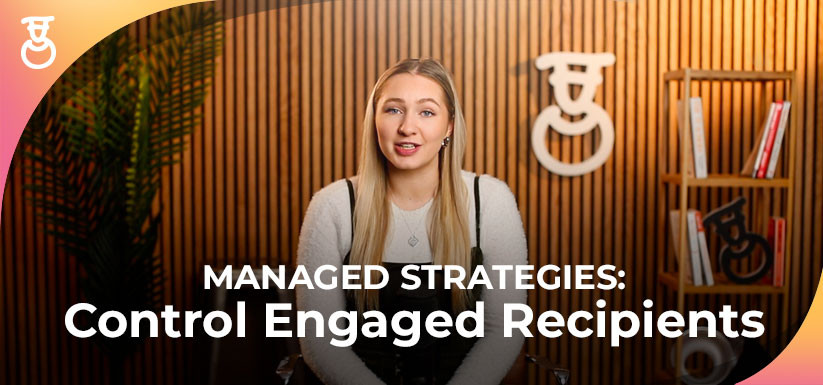

Following Up On Hot Prospects - Your Engaged Recipients
Target the educators and education staff that matter to your selling-to-schools email campaigns


An Overview of the 2022 Exam Season
Read our 2022 exam cheat sheet, and find out what’s different about this year’s exams, and what you need to do to hit top marks during this period.


Expert marketing to schools support and solutions
Expert marketing to schools solutions
Email Head Teachers, Teachers, and Staff Inboxes
Email teachers and staff inboxes
Sell More to UK and Global Schools and Colleges
Sell more to schools and colleges

















